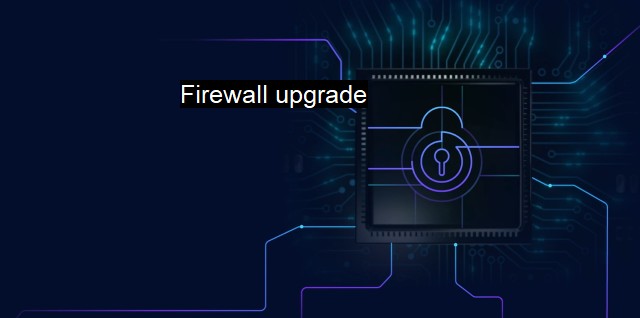What is Firewall upgrade?
Strengthening Your Cyber Security: The Significance of Firewall Upgrades to Protect Networks from Advanced Threats"
A firewall is an essential element of cybersecurity infrastructure that serves as a buffer between internal networks and the vast, potentially hazardous realm of the internet. As the primary line of defense for an organization's network, a firewall has the key responsibility of filtering traffic, blocking unwanted access, and allowing secure data exchange. Thus, a "firewall upgrade" indicates the process of enhancing and modernizing the existing firewall system, ensuring it remains robust against evolving security threats.Traversing the pathway of innovation and evolution, cyber threats have consistently morphed into sophisticated variants, challenging conventional security potency by exploiting loopholes. Within this context, the necessity for upgrading firewalls persists to maintain optimum functional efficacy and adaptability against dynamic challenges. An advanced firewall security system ensures that the shield continually remodels and fortifies itself, staying ahead of the growingly complex threat landscape.
Upgrading has multifaceted implications that revolve around fortifying both hardware and software capabilities. On the one hand, hardware enhancements escalate the overall capacity of a firewall, allowing it to efficiently handle larger volumes of traffic, better manage deep packet inspections, and improve the general performance speed. This ensures that the protective mechanism doesn't inhibit the network's function but instead facilitates a seamless and secure work environment.
Conversely, upgrading the software component involves improved threat detection and prevention mechanisms. Modern firewalls leverage artificial intelligence and machine learning to recognize unusual activity patterns or traffic anomalies, thereby offering real-time detection and mitigation of threats. These advancements ensure that the firewall remains vigilant and agile, capable of countering even the most covert cyber intrusion attempts.
An upgraded firewall can effectively regulate internal traffic, providing an auxiliary layer of protection by identifying potential internal threats. Inadequate internal traffic regulation often renders the organization susceptible to attacks from its inside. By controlling data access and monitoring user activity, an upgraded firewall maintains internal orderliness, mitigates data breaches resulting from internal mishaps, and safeguards critical enterprise assets and information.
A firewall upgrade also ensures compatibility with other cyber-defense mechanisms like antivirus software. An advanced firewall can coordinate well with antivirus solutions, producing a more holistic and secured network. This component's synergistic operation and seamless integration aids in identifying vulnerabilities, inhibiting malware incursions, and reinforcing the overall network defense capability.
Firewalls play a crucial role in maintaining a secure virtual private network (VPN), which requires substantial computing power and advanced-programming functionality. Upgrading the firewall system makes sure that remote connections are kept secure and function without interruption, specifically invaluable in an era where remote work and global connectivity are rampant.
While firewall upgrades seemingly present an upfront cost—both in terms of monetary investment and the manpower required for the implementation—they are inarguably crucial in risk mitigation and reduction of potential financial liabilities posed by data breaches or network compromises. By providing thorough security analyses, enforcing data governance protocols, and adhering to legal compliance, an upgraded firewall can save the organization from extravagant expenditure resultant from thriving cyber crimes.
In an era dominated by digital transformation, the concept of firewall upgrading stands central to cybersecurity strategies. It amplifies security posture, empowers network performance, enhances synergy within security frameworks, and protects valuable data while facilitating seamless business operations. A strategic investment in firewall upgrades can offer significant returns in avoiding breaches, maintaining privacy, and nurturing consistent user trust in an interconnected world. As information turns into the currency of the modern time, it would be wise to invest sufficiently and strategically in securing our assets, starting at the frontlines with an upgraded firewall.

Firewall upgrade FAQs
What is a firewall upgrade and why is it important in cybersecurity?
A firewall upgrade is the process of updating or replacing an existing firewall system in your network infrastructure. It is important in cybersecurity because a firewall acts as the first line of defense against cyber attacks and upgrading it can improve your network's security posture.What are the benefits of firewall upgrade in terms of antivirus protection?
A firewall upgrade can help improve antivirus protection by strengthening the firewall's capability to detect and prevent malware from entering your network. Additionally, a upgraded firewall can provide better integration with antivirus software, making it easier to manage and monitor antivirus activities in real-time.What are the common challenges faced during a firewall upgrade?
Common challenges during a firewall upgrade include ensuring compatibility with existing network infrastructure, managing the configuration and settings of the new firewall, and minimizing downtime during the upgrade process. It is important to plan and test the upgrade thoroughly to avoid potential disruptions to critical business operations.How often should a firewall upgrade be performed?
Firewall upgrades should be performed periodically to ensure that your network is protected against the latest cyber threats. The frequency of upgrades depends on several factors, including the size of your network, the complexity of your IT environment, and the level of security needed. As a general rule, a firewall upgrade should be performed at least once every three to five years.| | A | | | B | | | C | | | D | | | E | | | F | | | G | | | H | | | I | | | J | | | K | | | L | | | M | |
| | N | | | O | | | P | | | Q | | | R | | | S | | | T | | | U | | | V | | | W | | | X | | | Y | | | Z | |
| | 1 | | | 2 | | | 3 | | | 4 | | | 7 | | | 8 | | |||||||